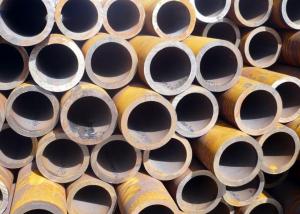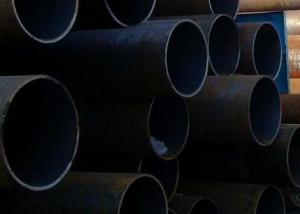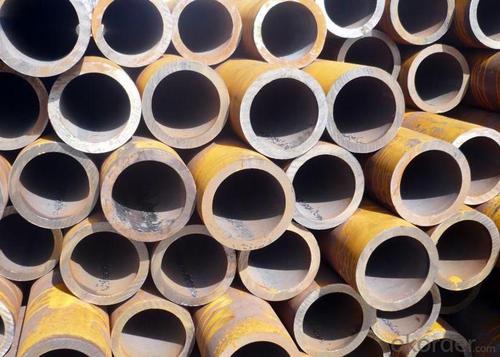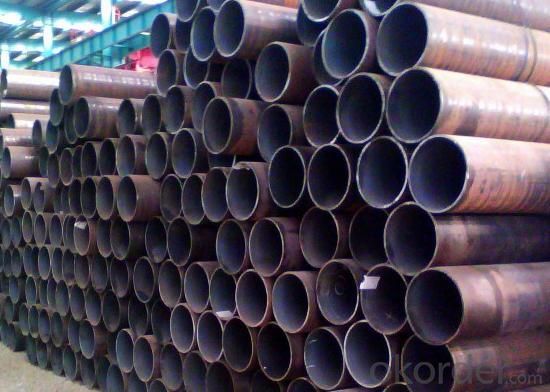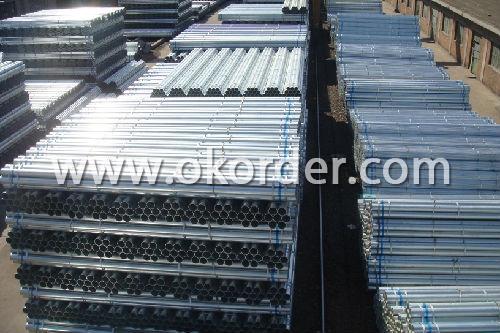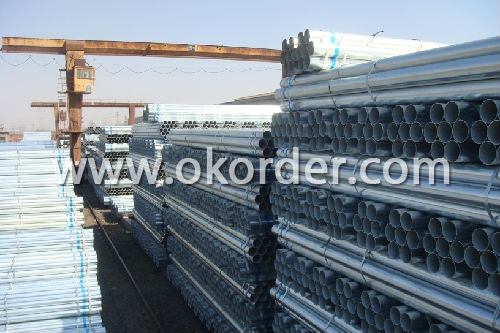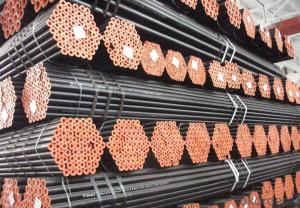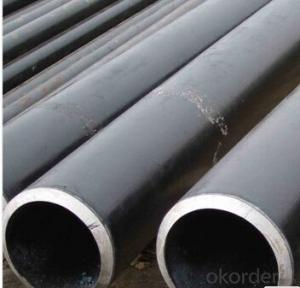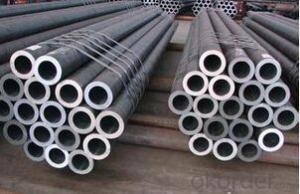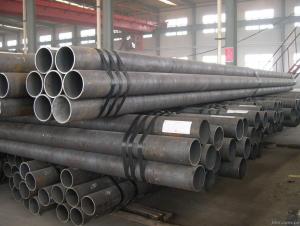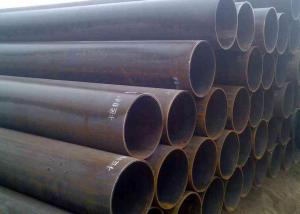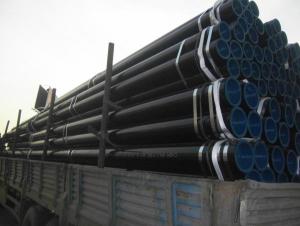A53/1045 Stainless Steel Seamless Pipe/Pipes For Low Medium Pressure Boiler
- Loading Port:
- China Main Port
- Payment Terms:
- TT or LC
- Min Order Qty:
- 50 MT m.t.
- Supply Capability:
- 5000 Tons Per Month m.t./month
OKorder Service Pledge
OKorder Financial Service
You Might Also Like
| Seamless steel tubes and pipes for low and medium pressure boiler |
| |||||||||||||||||||||||||||||||||||||||||||||||||||||||||||
- Q: What are the different methods of pipe protection for steel pipes?
- There are several different methods of pipe protection for steel pipes, each serving a unique purpose and providing varying levels of protection. Some of the common methods include: 1. Coatings: Coatings are applied on the external surface of steel pipes to protect them from corrosion and other environmental factors. Coating materials can include various types of paints, epoxies, or polymers. These coatings create a barrier between the pipe surface and the surrounding environment, preventing the steel from coming into contact with corrosive elements. 2. Wrapping: Wrapping involves using a protective material, such as tape or shrink wrap, to cover the steel pipe. This method provides a physical barrier against moisture, chemicals, and other corrosive substances. Wrapping is often used in combination with coatings to enhance the overall protection. 3. Cathodic Protection: Cathodic protection is an electrochemical method used to protect steel pipes from corrosion. It involves connecting the steel pipe to a sacrificial anode, typically made of zinc or magnesium. The anode corrodes instead of the pipe, which helps to prevent the steel from deteriorating. This method is commonly used for buried or submerged pipelines. 4. Thermal Insulation: Thermal insulation is used to protect steel pipes from extreme temperatures. Insulating materials, such as foam or mineral wool, are applied around the pipe to minimize heat transfer. This method is particularly important for pipes carrying hot fluids or exposed to extreme weather conditions. 5. Vibration Dampening: Vibration can cause stress and fatigue on steel pipes, leading to potential damage. To protect against vibrations, various techniques can be employed, such as using vibration damping pads or installing supports and clamps. These methods help to absorb and dissipate the energy generated by vibrations, reducing the risk of pipe failure. 6. Concrete Coating: For pipelines installed underwater or in highly corrosive environments, concrete coating is often used. A layer of concrete or a cement-based mortar is applied to the steel pipe, providing both mechanical protection and resistance to corrosion. It is important to select the appropriate method of pipe protection based on the specific application, environmental conditions, and desired level of protection. Regular inspection and maintenance are also crucial to ensure the long-term integrity of steel pipes.
- Q: Are steel pipes suitable for use in sewage treatment plants?
- Yes, steel pipes are suitable for use in sewage treatment plants. Steel pipes are durable, corrosion-resistant, and have a long lifespan, making them ideal for handling the harsh conditions and corrosive substances found in sewage systems. Additionally, steel pipes offer high strength and are capable of withstanding high-pressure flows, making them a reliable choice for sewage treatment plants.
- Q: What is the purpose of pipe flanges in steel pipes?
- The purpose of pipe flanges in steel pipes is to provide a connection point between two pipe sections, allowing for easy assembly, disassembly, and maintenance of the pipeline. Flanges also help to create a leak-proof seal, enhance the strength and stability of the joint, and provide flexibility for expansion and contraction of the pipes.
- Q: How do steel pipes handle vibrations?
- Steel pipes are known for their ability to handle vibrations effectively. Due to their strong and rigid nature, steel pipes can withstand various types of vibrations, including mechanical vibrations and seismic activities. The resilience of steel pipes is attributed to their structural integrity and strength. Steel pipes have high tensile strength, which enables them to resist deformation or breakage when subjected to vibrations. They are also resistant to fatigue, meaning they can endure repeated vibrations without experiencing any significant damage. This makes steel pipes ideal for applications that involve constant or cyclic vibrations, such as in industrial settings or for transportation of fluids through pipelines. Moreover, steel pipes have the advantage of being able to dampen vibrations due to their mass. The weight of the steel pipe helps absorb and dissipate the energy produced by vibrations, preventing excessive movement or oscillation. This damping effect contributes to the overall stability and durability of the pipe system. To further enhance the ability of steel pipes to handle vibrations, various measures can be taken. These may include the use of vibration isolators or dampers, which are devices designed to reduce the transmission of vibrations from the surrounding environment. Additionally, proper installation techniques and regular maintenance can help ensure that steel pipes continue to perform optimally under vibration-prone conditions. In summary, steel pipes are well-suited to handle vibrations due to their strength, resistance to fatigue, and ability to dampen vibrations. Their robustness and durability make them a reliable choice for applications where vibrations are a concern, ensuring the safe and efficient transport of fluids or materials.
- Q: How do you clean and maintain steel pipes?
- To clean and maintain steel pipes, start by removing any dirt, dust, or debris using a soft cloth or brush. Then, use a mild detergent mixed with water to wash the pipes thoroughly. Rinse them with clean water and dry them completely to prevent rusting. Regularly inspect for any signs of corrosion or damage, and promptly address any issues. Applying a rust-resistant coating can also help in maintaining the pipes' longevity.
- Q: What are the factors to consider when selecting pipe materials for high-temperature applications?
- When choosing pipe materials for high-temperature applications, several factors must be taken into account. First and foremost, the thermal conductivity of the material is crucial. Efficient heat transfer and prevention of heat buildup are necessary in high-temperature applications, therefore materials with high thermal conductivity, like copper and stainless steel, are commonly used in these installations. Secondly, it is important to consider the material's resistance to thermal expansion. Pipes tend to expand when exposed to high temperatures, so selecting materials with low thermal expansion coefficients is vital to avoid deformation and potential pipe failure. Carbon steel and stainless steel are suitable options as they exhibit relatively low thermal expansion. The material's mechanical strength and resistance to corrosion should also be considered. High temperatures can weaken or corrode certain materials, leading to structural failures. Therefore, it is essential to choose materials, such as alloy steel and nickel-based alloys, that can withstand high temperatures without compromising their mechanical strength or corroding easily. Additionally, the cost and availability of the materials should be taken into account. Some high-temperature pipe materials may be expensive or hard to obtain, which can impact the project's budget and timeline. It is important to find a balance between the desired material properties and the project's financial and logistical constraints. Lastly, it is crucial to consider the specific application requirements and industry standards. Different industries may have guidelines or regulations regarding pipe materials for high-temperature applications. Ensuring that the selected materials comply with these standards is essential for safety, reliability, and adherence to industry regulations. To conclude, the factors to consider when choosing pipe materials for high-temperature applications include thermal conductivity, resistance to thermal expansion, mechanical strength, resistance to corrosion, cost and availability, and compliance with industry standards. By carefully evaluating these factors, one can select the most suitable pipe material to ensure efficient and reliable operation in high-temperature environments.
- Q: Can steel pipes be used for underground transportation tunnels?
- Underground transportation tunnels can indeed utilize steel pipes. For a multitude of purposes like water, gas, and sewage transportation, steel pipes are commonly employed in the construction of these tunnels. Renowned for their resilience, durability, and ability to resist corrosion, steel pipes are remarkably suitable for underground applications. With the capacity to endure the weight and pressure exerted by the nearby soil, they can also be reinforced to guarantee stability. Moreover, steel pipes offer flexibility in tunnel design as they can be manufactured in various sizes and lengths. Nonetheless, one must carefully consider factors such as soil conditions, load-bearing capacity, and potential environmental impacts before opting for steel pipes in underground transportation tunnels.
- Q: Are there specifications for scaffold steel pipe with 48mm * 3.2mm?
- However, there are a variety of non GB steel tubes on the market, mainly in the wall thickness, and are thinner than the national standard requirements, you said that thickness may have, but the thinnest only about 2.6mm-2.7mm.
- Q: Can steel pipes be used for underground sewer lines?
- Yes, steel pipes can be used for underground sewer lines.
- Q: What is the lifespan of galvanized steel pipes?
- The lifespan of galvanized steel pipes can vary depending on various factors such as the quality of the galvanization, the environment in which they are installed, and the maintenance they receive. However, on average, galvanized steel pipes can last between 40 to 70 years.
1. Manufacturer Overview
| Location | Jiangsu, China |
| Year Established | 1992 |
| Annual Output Value | 60,000Tons |
| Main Markets | Europe and the United States;Canada; India;Bulgaria; South Korea;etc. |
| Company Certifications | API 5L;API 5CT;GB/T19001-2008 idt ISO9001:2008 |
2. Manufacturer Certificates
| a) Certification Name | |
| Range | |
| Reference | |
| Validity Period |
3. Manufacturer Capability
| a) Trade Capacity | |
| Nearest Port | Yan Cheng |
| Export Percentage | 50% - 60% |
| No.of Employees in Trade Department | 400-500 People |
| Language Spoken: | English; Chinese; Spanish |
| b) Factory Information | |
| Factory Size: | Above 110,000 square meters |
| No. of Production Lines | Above 10 |
| Contract Manufacturing | OEM Service Offered; Design Service Offered |
| Product Price Range | Average |
Send your message to us
A53/1045 Stainless Steel Seamless Pipe/Pipes For Low Medium Pressure Boiler
- Loading Port:
- China Main Port
- Payment Terms:
- TT or LC
- Min Order Qty:
- 50 MT m.t.
- Supply Capability:
- 5000 Tons Per Month m.t./month
OKorder Service Pledge
OKorder Financial Service
Similar products
Hot products
Hot Searches
Related keywords
